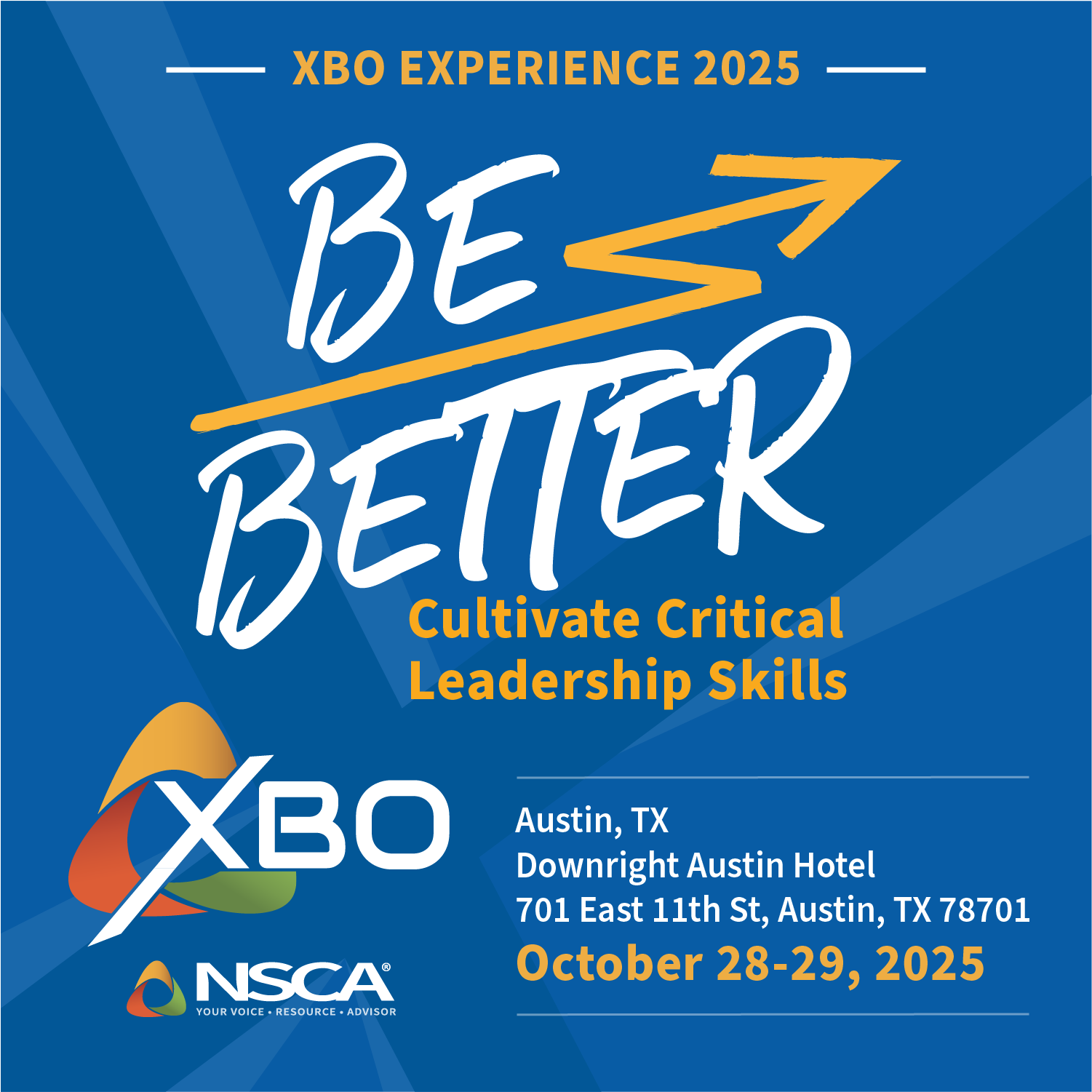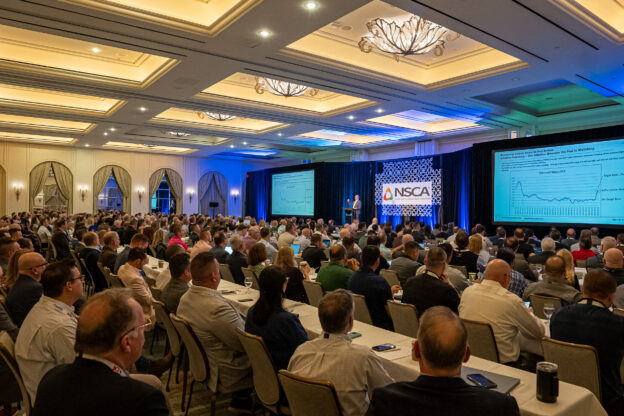
XBO Schedule

Integration for the Next Generation
NSCA is excited to bring back the XBO Experience for its second year! Mark your calendars for October 28-29, 2025, and join us at Downright Austin, A Renaissance Hotel in Austin, TX for two days of interactive learning, career insights, and next-gen training designed to help integrators thrive.

Level Up Your Career
Whether you’re new to the industry or rising fast, XBO offers industry-specific development and networking opportunities made for the next generation of integration leaders.
XBO 2025 Schedule
The XBO Experience brings a new focus to ongoing and emerging trends, as well as educates newer professionals about the industry’s best practices and most proven methods.
Powered by NSCA’s Next Gen Academy curriculum with support from NSCA’s tried-and-true business insights, we’ve built this schedule to aid in prepare new leaders for the generational shift underway now.
Check out what the NSCA team has planned with the schedule below.
The XBO’s schedule is chock-full of great content. Here’s what you can expect:
- Emotional intelligence
- Communication styles
- Workplace conflict
- Organizational culture
- Trust and vulnerability
- Organizational behaviors
- Change management
- Financial literacy
View Schedule Below!
7:00 am
8:00 am
9:00 am
9:15 am
10:30 am
10:45 am
12:00 pm
1:00 pm
2:00 pm
2:15 pm
3:30 pm
4:00 pm
5:00 pm
Breakfast
Opening Session | Thrive Through Change: Leading with Confidence in Uncertain Times
The only constant in life is change—so you might as well learn to navigate it. But there’s a difference between simply surviving change and thriving through it. The latter requires the right combination of skills, empathy, and strategy. This session equips future leaders with tools they can use to help their teams adapt and stay focused during transitions, even when they need to pivot quickly. Arm yourself with strategies to address resistance effectively and avoid feelings of overwhelm by learning to manage and lead through change effectively.
Breakout 1 | Risk-Proof Your Leadership: Strategies to Anticipate, Mitigate, and Adapt
The goals you set, decisions you make, and actions you take are all potential forms of risk management. They can mitigate risk—or introduce it. This session equips you with the tools and strategies you need to maintain safety, ensure compliance, and alleviate risks effectively, including frameworks for risk analysis and contract review. Gain a clear understanding of industry standards and learn how to lead teams through failures, breaches, and other incidents with confidence and quick decision-making. You’ll leave with a better understanding of how deviating from policies, protocols, or contractual obligations can affect you, your team, your company, and your clients.
Breakout 2 | Tech-Savvy Leadership: Leverage Technology to Empower Your Team
Staying competitive means understanding when, how, and why to adopt emerging technologies that can make your company more efficient. This session talks about the importance of keeping up with industry trends as a leader, as well as how to effectively lead teams through transitions as they learn to integrate new tools, systems, and platforms into their workflows. We’ll explore strategies for evaluating which new technologies are worth investing in, which existing technologies are worth keeping, and which have become obsolete for your company’s operational approach. Finally, we’ll explain how embracing technology individually and as a team can enhance value and skills.
Sponsor Table Talks
Lunch
Keynote Session | From Plans to Progress: Project Management for Leaders Who Get Things Done
Project management is a skill that every effective leader needs in order to drive success and navigate complexities with confidence. While you may not be overseeing your customers’ technology projects, you’ll have critical projects of your own to manage effectively and strategically. These projects demand a strategic vision, careful planning, and seamless execution. We’ll dive into the essentials of project management, including time management, workflow simplification, and challenge resolution, to help you enhance efficiency and optimize project outcomes. We’ll also explore prioritization frameworks like the Eisenhower Matrix and MoSCoW Method that you can put into practice to identify and resolve workflow bottlenecks, document processes, and mitigate risk. Finally, we’ll discuss trusted project management tools that can be used to set goals, prioritize actions, and improve task tracking.
Breakout 3 | Problem-Solving Like a Pro: Simple Strategies for Tough Challenges
No matter what type of leadership role you’re in, your ability to problem-solve will shape the success of your team. To help you hone these skills, this session examines the art of problem-solving and the steps involved with breaking complex challenges into smaller, more manageable steps. We’ll explain how to:
- Identify the root case of a problem (not just the symptoms)
- Determine whether you should speed up or slow down your decision-making process
- Analyze and troubleshoot situations using proven frameworks like the “5 Whys” and PDCA
- Implement efficient solutions
Brainstorming techniques like Mind Mapping and SCAMPER will also be discussed as vital ways to unlock creativity, foster collaboration, and consider potential solutions so you can approach problems with clarity and confidence.
Breakout 4 | Unlock Operational Excellence: Learning to Streamline, Scale, and Succeed
Operational excellence is about delivering maximum value. How can you create a culture where employees and other leaders are always looking for ways to improve? This session analyzes the elements of operational excellence, so you better understand how to align people and processes and allocate resources effectively. We’ll explore how technology, operations, and people interact to influence outcomes—positively and negatively—and discuss ways to better evaluate the long-term effects of seemingly simple decisions.
Cocktail Hour
Sponsor Dinners
7:00 am
8:00 am
9:00 am
9:15 am
10:30 am
10:45 am
12:00 pm
1:00 pm
Breakfast
General Session | Power in Perspectives: Embracing Differences to Unlock Your Team’s Potential
To unlock the full potential of your team, you need to be able to take advantage of the unique perspectives, backgrounds, and experiences that exist within it. Learn how to navigate the dynamics of diverse teams to encourage effective collaboration and communication. When you embrace instead of quelling different viewpoints during brainstorming, problem-solving, and decision-making processes, you get more comprehensive and impactful outcomes as a result. If you want to build a workplace where everyone contributes their best work and feels like they truly belong, then start by fostering an environment where everyone feels comfortable speaking up and sharing ideas.
Sponsor Table Talks
Breakout 5 | Trust First, Then Teamwork: Building Stronger Connections for Success
In work and in life, successful relationships are built on trust. And trust is the foundation upon which successful teamwork and organizational excellence are established. In a high-trust environment, leaders work together instead of against one another to achieve goals faster. This session introduces you to actionable strategies—from delivering on promises to demonstrating value-adding behaviors—that leaders can use to foster trust in any setting. Learn how to build credibility through self-improvement, use the right language to shape perceptions, and communicate openly without compromising professionalism.
Breakout 6 | The Ownership Mindset: Building a Workforce that Drives Success
Empowerment is the key to developing a high-performing, motivated workforce. Empowered employees feel a sense of ownership, have a voice, and don’t fear failure. Find out what it takes to help your employees feel more confident and more motivated in their roles. Help them understand how relevant they are to company success, and how critical it is that they believe in the value of the products and services your company provides. You’ll learn to model resilience under pressure, create a culture of accountability, and find the right balance between autonomy and support. The result: a team that doesn’t just meet goals—they own them.
Lunch
Closing Session | Listen Like a Leader: The Secrets to Influence and Impact
Communication is about building trust, fostering collaboration, and driving results. In this session, you’ll perfect your communication to inspire, motivate, and lead with impact. By learning how to use the right engagement methods at the right time—and with the right people—will help you improve relationships, solve problems, and build credibility. Whether you’re talking to coworkers or clients, effective communication begins with active listening and asking the right questions so you can engage fully in conversations and ensure mutual understanding. In this session, we’ll explore techniques, tools, and proven methods to go beyond simply hearing words to fully engaging with and understanding others. You’ll learn to navigate tough conversations, simplify technical topics for non-technical audiences, and change your communication approach based on personality types.

Book XBO Early and Save
NSCA members are eligible for a reduced XBO Experience rate by registering early! Don’t miss your chance to experience this new must-attend event for emerging professionals in the system integration industry.













